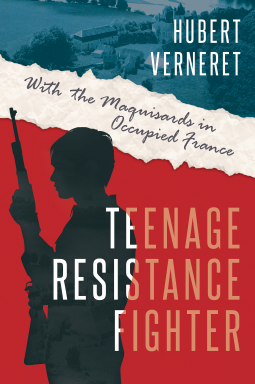
Teenage Resistance Fighter
With the Maquisards in Occupied France
by Hubert Verneret
This title was previously available on NetGalley and is now archived.
Send NetGalley books directly to your Kindle or Kindle app
1
To read on a Kindle or Kindle app, please add kindle@netgalley.com as an approved email address to receive files in your Amazon account. Click here for step-by-step instructions.
2
Also find your Kindle email address within your Amazon account, and enter it here.
Pub Date Dec 03 2017 | Archive Date Dec 31 2017
Description
• The unique first-hand account of a young man who joined the Louis maquis when it was a well-organized group operating out of bases in the forest of the Morvan. Daily he wrote candid descriptions of how they operated, and his experiences, thoughts and fears
• Published in two editions in France, with prefaces by well-known wartime leaders, it is available for the first time in English
• Engaging insight into the mind of a young man who passionately wants to contribute to liberating his country, but also struggles with the larger themes of war
• Appendices includes interviews that Verneret conducted with older maquisards after the war about their experiences
Hubert Verneret was a fourteen-year-old schoolboy in South Morvan, Burgundy, when the Germans invaded Poland, and fifteen when France fell. A boy scout, he helped refugees, aided the gendarmerie, moved wounded soldiers, and dug out bodies after air raids. Throughout, he wrote an eloquent diary that noted not only his actions but his thoughts and feelings as the French troops retreated and the Germans arrived.
In 1944, aged nineteen, he decided to join the local maquis resistance fighters, operating from a hidden base in the forest. Though constantly in danger as he undertook his duties, his youthful optimism turned to frustration as he felt he was fated never to fight the Germans, never to take a prisoner. As the Allies approached, the maquisards worked to upset and weaken the retreating Germans to aid the Allied advance.. Hubert details the joy with which the maquisards were welcomed in local villages when the fighting ended. Only as he listened to the speech given as the maquisards disband did he understand that his part in the war, while perhaps not heroic as that played by others, was still important in gaining the victory.
Years later, Hubert interviewed local maquisards to understand more about maquis history; their words and excerpts from the diary of a local civilian during the German retreat provide context to Hubert's youthful testimony. This first English edition of Hubert's diary retains the original prefaces by Colonel Buckmaster, chief of the French section of the SOE, and Colonel d'Escrienne, aide de camp to General de Gaulle.
A Note From the Publisher
Advance Praise
"Hubert Verneret was able to highlight the feelings of young people of his time; they match our memories exactly, whether we lived in France or in Great Britain, whether we were then wearing his Majesty's uniform, or the armbands of the maquisards."
--Colonel Maurice Buckmaster
Marketing Plan
• National review & feature attention.
• Online media & promotion.
• Available on NetGalley.
• Catalog and website advertising.
• Sales presentations to all major chain stores, select local bookstores, national catalog, booksellers, and book clubs.
Available Editions
| EDITION | Hardcover |
| ISBN | 9781612005508 |
| PRICE | $24.95 (USD) |





